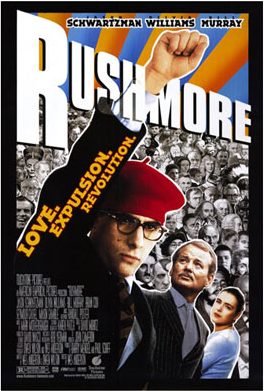
I didn't get Rushmore the first time I saw it, so I thought that, having seen most of Wes Anderson's subsequent films, it was time to revisit. And yes, I get it now. The problem is that it still leaves me a little cold. Part of my trouble with the movie lies with its central character, Max Fischer, who as played by Jason Schwartzman and written by Anderson and Owen Wilson begins as such an obnoxious twerp that it's hard to switch allegiance when the film eventually turns him into a sympathetic figure. It's difficult, too, to see why Olivia Williams's character, Miss Cross, puts up with him so long. My suspicion is that Williams didn't quite understand what Anderson and Wilson were going at with her part -- maybe she didn't get Rushmore either. As a result, we see her torn between two inappropriate suitors, Schwartzman and Bill Murray, but playing her part as a conventional romantic comedy heroine. Fortunately, everyone else in the cast, including such splendid actors as Seymour Cassel and Brian Cox, is completely into the loopy world that Anderson has created. There are those who think that in his later movies Anderson has either gone too cutesy or atrophied into a kind of zaniness for zaniness's sake, but I'm not one of them. I think he has learned how to superimpose his eccentric stories on the real world so that they work as the kind of satiric commentary that doesn't quite come off in Rushmore.